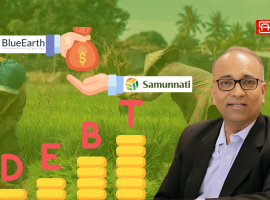From Screen to Boardroom: The Impact of ‘Shark Tank India’ Celebrity CEOs
Three points you will get to know in this article:
- The Sharks capitalize on newfound fame, yet experts assert that Shark-owned businesses can’t solely rely on celebrity status.
- Sharks collectively experience a 68X increase in average Instagram followers.
- Shark Tank India, a two-year-old business reality show, sparked the rise of celebrity CEOs in India.
In contrast to its American counterpart, “Shark Tank India” is relatively youthful, yet it has garnered a dedicated fanbase. Ever since its debut in December 2021, the show has experienced an explosive surge in popularity. The Indian rendition of “Shark Tank” not only dominates discussions around Indian dinner tables but has also propelled startups into the limelight.
A noteworthy distinction between the American and Indian versions lies in the selection of judges. Unlike the U.S. edition, featuring industry veterans and corporate titans with decades of business acumen, the Indian show is helmed by judges who embody the spirit of new-age entrepreneurship or boast diverse experiences, though exceptions exist. The show presents a refreshing take on the entrepreneurial journey, resonating with audiences far and wide.
Naturally, the discerning Indian judges exhibit a thoughtful approach, refraining from playful water antics with each other, at least for the time being (no pun intended). This sudden reference is set against the backdrop of a particular episode from the American rendition of the show. In that instance, Richard Branson, the esteemed British business magnate, playfully douses Mark Cuban, one of the show’s wealthiest Sharks. The dynamic duo responds with laughter, shrugging off the watery exchange.
Lucky Break for ‘Shark Tank India’?
Let’s transport you back to the moment “Shark Tank India” graced our screens with its inaugural episode in December 2021. Coincidentally, this marked a period when cutting-edge tech ventures were capturing the keen interest of investors, resulting in a substantial influx of capital.
Whether attributed to serendipity or meticulous marketing orchestration, season 1 of the reality TV show featured a distinguished panel of judges comprising seven enterprising Indians. Among them were Ashneer Grover, the former MD and co-founder of BharatPe; Aman Gupta from boAt; Anupam Mittal, the mind behind Shaadi.com; Ghazal Alagh of MamaEarth; Namita Thapar, the executive director at Emcure; Lenskart’s Peyush Bansal; and Vineeta Singh from SUGAR.
Emerging from diverse backgrounds, wielding distinct areas of expertise and engaging in varied business realms, they shared a common thread — most of them were venturing into entrepreneurship for the first time.
Swiftly becoming a sensation, these individuals captured the nation’s collective attention. Aspiring entrepreneurs across the country began to envision themselves as the next Aman Gupta or Ashneer Grover in the vibrant landscape of Indian startups.
The enthusiasm among fans has reached unprecedented levels, causing even the most basic dialogues to catch on rapidly — phrases like “Hum bhi bana lenge” or “Yeh sab dogalapan hai” have become widespread. The stars of the Sharks dazzled brilliantly, and Aman, one of the judges, received a special invitation to the prestigious Cannes Film Festival, garnering him worldwide acclaim.
Sharks’ Rise to Prominence
In the vibrant landscape of Indian startups, a standout characteristic is their significant investment in marketing and promotional endeavors. Numerous instances validate this assertion. Despite grappling with substantial losses, enterprises like BYJU’S, CRED, Unacademy, and MyGlamm, among others, persist in allocating substantial sums, running into crores of rupees, to secure official sponsorship positions at cricket matches, fashion extravaganzas, lifestyle events, and reality TV shows—all in a strategic pursuit of garnering attention within the cricket-centric Indian market.
As per the Inc42 Financials Index, a total of 210 unicorns and soonicorns collectively expended a staggering $2.7 billion on advertising during the FY22 period. Interestingly, for the participants in the ‘Sharks’ show, the spotlight not only presented a multitude of opportunities to enhance their image but also proved to be a compelling avenue to augment their revenues significantly.
Personal Branding vs. Product Branding?
In a research paper released on the London School of Economics website in July 2021, it was affirmed that despite the numerous perks enjoyed by “celebrity CEOs,” their elevated status doesn’t always equate to a corresponding surge in the profits of the companies under their leadership.
The insights gathered from discussions with seasoned marketing professionals indicate a consensus: while the CEOs enjoy celebrity status, the success of their enterprises predominantly hinges on the inherent value of the products or services they offer.
Expanding on this perspective, another marketing expert emphasized that the fame of these CEOs, often referred to as “Sharks,” does not significantly correlate with the financial success of their respective companies.
Furthermore, a marketing veteran, preferring anonymity, underscored that the viewership of “Shark Tank India” is considerably limited compared to the vast markets these businesses cater to. Regrettably, contemporary marketers seem to favor the simplicity of television and digital campaigns over conducting a thorough brand health assessment to grasp consumer sentiment and behavior.
Attaining Celebrity Status: What’s the Price?
In a recent post across his social media platforms, Nithin Kamath, the CEO and co-founder of Zerodha, sheds light on the drawbacks associated with taking the path of celebrity status.
Kamath explicitly underscores that the “yearning to amass a substantial following on social media can lead down a treacherous path.”
In the realm of brand and marketing consultancy, Saurabh Parmar, an independent expert, asserts that the positive impact of personal branding for business owners reaches a zenith before gradually waning.
According to Parmar, “The influence of crafting an image for your business will begin to plateau, even as your celebrity status continues to ascend. Assuming the role of a Shark Tank judge won’t necessarily translate to increased sales, perhaps more visibility, but not guaranteed sales in the value-centric Indian market.
While more people may take notice of the brand, there’s no assurance that they’ll become customers solely because the brand owner has become a public figure.”
However, it’s crucial to acknowledge that this is just one perspective. An equally pertinent consideration is that ‘the bigger they are, the harder they fall.’ Marketing experts caution that assuming a public persona exposes startup founders to scrutiny, potentially jeopardizing their brand reputation.
In the previous year, Peyush Bansal found himself compelled to extend a public apology to the esteemed community of Chartered Accountants in India, following his contentious statement about CAs on an episode of Shark Tank India.
The credibility of founders, even those who achieve celebrity status, is susceptible to erosion due to questionable actions. This phenomenon became evident in the instance of Grover from BharatPe, who is embroiled in a protracted struggle against accusations of misusing the company’s funds.
At present, Indian Sharkpreneurs have skillfully upheld their esteemed status by steering clear of controversies. Nevertheless, their widespread acclaim, while a boon, poses a challenge, compelling these startup visionaries to tread cautiously and guard against any potential threats to their image and, consequently, their brand.
The crux lies in the sagacity of these founders to discern the unwritten rules that accompany celebrity stature. Those Sharks who deftly navigate this delicate balance are poised to enjoy enduring positive repercussions on their brand. Yet, for this to unfold, the show must persist with its captivating narrative.
In the captivating world of “Shark Tank India,” where star-studded entrepreneurs shine, the conclusion reveals a nuanced reality. While the show catapults founders into the limelight, the journey from celebrity status to business success is intricate. Celebrity CEOs, akin to the ‘Sharks,’ must navigate the fine line between personal branding and tangible business value. As the spotlight intensifies, so does the scrutiny. The sagacity of these founders to uphold their esteemed status while avoiding pitfalls will determine the enduring impact on their brand. The show’s captivating narrative becomes a crucial backdrop for their ongoing journey in the dynamic realm of Indian startups.




